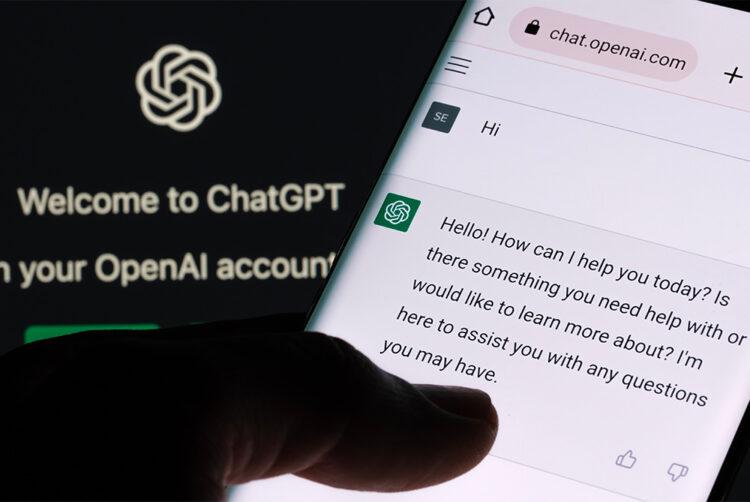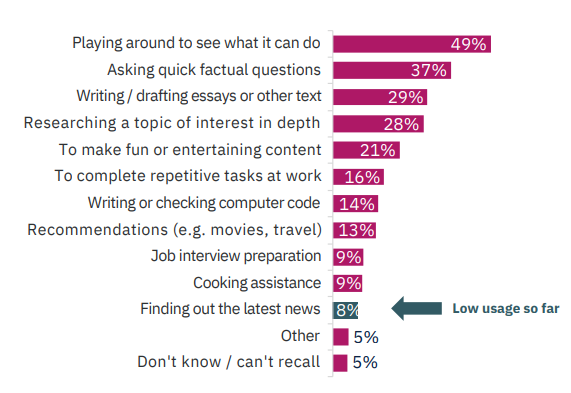How much should publishers worry about consumers using AI search for news?

As Google and Microsoft’s Bing continue to integrate chatbots into their search functions, publishers are wary that the technology could cause a severe decline in referral traffic as consumers are less incentivised to click on links for information.
Publishers’ traffic has already been severely affected by social media companies’ decision to deprioritise news in the past year on platforms including Facebook, Instagram and X/Twitter.
Last year, Google rolled out an experimental version of an AI-generated search function in 120 countries. AI-generated results still include links to publishers’ websites where relevant, but publishers are concerned that there will be less incentive to click on articles if answers to queries are already displayed by AI in the results.
According to YouGov data in the latest report from the Reuters Institute for the Study of Journalism, just 8% of people who have used an AI chatbot say they have done so to find out the latest news.
But it is still early days for the technology and chatbots have only been capable of accessing up-to-date material for a few months (previously chatbots such as ChatGPT could only access content published online before September 2021).

As the Reuters report explains: “Much will depend on how the search providers, particularly Google, which accounts for around 90% of the market, decides to proceed. It needs to balance its existing business model, which is built on links, with the need to remain competitive with other [search] providers.”
A survey of news editors published in November 2023 by the News Media Association found that nine in 10 editors now consider Google, as well as Meta, “existential threats” to journalism.
Analysis: News could become even more commoditised
On a recent episode of The Media Leader Podcast, editor-in-chief Omar Oakes and reporter Jack Benjamin discussed how publishers’ business models are at risk if more users begin using chatbots for their news consumption.
Listen to an excerpt of the episode or read a transcript of the conversation below:
Oakes: One of the big stories over the holiday period was The New York Times suing ChatGPT creator OpenAI over alleged copyright infringement. This is really interesting; we’ve seen the likes of authors and visual artists sue the company, but this is the first time a major news publisher as done so.
Jack, you know about these publishers, what do you make of this lawsuit? Axel Springer has gone a different way and is actually doing deals to sell access to their content library. The AP has done the same as well. Why such different strategies?
Benjamin: Different publishers are clearly considering different tactics. You mentioned Axel Springer and The Associated Press cutting deals — The New York Times was in the middle of potentially cutting a similar deal with OpenAI and Microsoft and clearly those conversations stalled, perhaps in part because The New York Times’ concerns about copyright infringement.
Some people think the lawsuit could actually be used as a bargaining chip by The New York Times in negotiations. We’re talking about potentially billions of dollars worth of damages that The New York Times is alleging.
Depending on the publisher you ask, some will say it’s better to work with the technology of the future, whereas others say: “OK, yes, but only if we’re not working with them to run ourselves out of business in a few years’ time.”
Because it’s true that in the near future, someone could simply Google something using Bard or using ChatGPT and ask it “what’s the latest news today?” and it’ll just spit out a summary of news that is built on the back of the really hard work of actual journalists. But people won’t have to actually go to news publishers any more for actual news.
New York Times lawsuit exposes split in publishers’ strategies
It speaks to one of the big issues that is under-discussed and that is the commoditisation of news. News has become so ubiquitous and samey from so many different outlets covering all the same things, such that you can just go to a chatbot and probably get the same thing. This would be a last straw if that were to happen.
So you have publications that are already working on new USPs. I subscribe to The New York Times and recently they’ve been sending push notifications for news analysis and opinion, more so than just breaking news.
You have publications trying really hard to make the case that they can still give you unique things and it doesn’t necessarily just have to be the news. And this broader conversation around AI plays a huge role in where we’re going toward that.
News is fickle and fast. If you’re The New York Times, a lot of people do go to you for [general] stories, but if you’re The Boston Globe, do you need to be covering what’s going on in Israel right now? Yes, but how many people are really going to you for news when there’s a million publishers out there doing the same thing?
Oakes: At the end of the day, it comes down to editorial judgement. If you’re the editor of The Boston Globe and you think it’s important to do that, then go ahead, you have your reasons.
I think news publishing has had this problem for a long time where, depending on how you look at it, there are too many journalists and there aren’t enough journalists. Because you have a lot of journalists running around all doing the same thing — churning out press releases or agency copy and not actually doing a lot of independent work themselves.
I think that’s the issue. Coming back to this issue of algorithms versus human beings — if you just follow what the algorithm does, then yeah you’re going to optimise to what worked yesterday. We need human beings and their crazy decision-making to make out-of-the-box decisions and think bigger.
Having said that — it does feel a bit Luddite-y, doesn’t it? From a public good point of view, [AI] just offers potentially so much.



